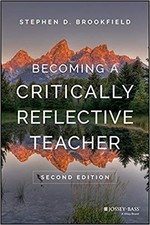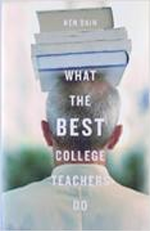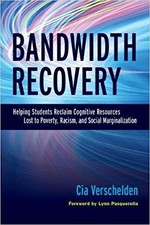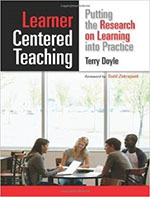What’s the Point of Grading?
At this point in the semester, when we’re slogging through stacks of papers and projects, it’s easy to lose sight of the purpose of grading. It’s not, in fact, to make ourselves and our students suffer. Our students’ final work should provide evidence of the learning they’ve done with us this fall. Students who have mastered the material at the appropriate level should do well.
Our top two concerns right now are keeping our grading aligned with the course goals and using our time efficiently. A good rubric or set of specifications helps on both counts. In order to develop such tools, we need a clear sense of what students should know or be able to do, and our priorities for their learning. What was the instructional purpose of the assignment? What is the exam meant to measure? There’s no need to comment on, or assign weight to, issues that are not explicitly part of the goals. Since students can no longer revise, and many don’t see or review our comments on their final projects, now is not the time to expend hours and energy crafting the sort of careful facilitative feedback that guides learning. Students need such feedback earlier in the semester, when they can use it to improve—now, at the end, what they need is transparency in our evaluation of their performance.
It’s always disappointing if the work our students submit doesn’t show the evidence of learning and accomplishment we were expecting. Sometimes that means our assessments weren’t well-aligned measures of their learning. It might be that students don’t have greatmetacognitive strategies, or they pulled too many all-nighters cramming for finals.
If you’re finding yourself tempted to grade on a forced curve, or besieged by last-minute requests for extra credit, it’s important to calibrate your response so that final grades reflect, as far as possible, how much students have learned. If students have mastered the material, but earned very poor grades, you may need to adjust your grading scale. Conversely, if high grades don’t seem to align with the level of mastery you’d like to see, you’ll also probably want to redesign your grading structure, exams, or assignments in the future.
If you’d like to discuss grading final projects or how to respond to end-of-semester grading questions or requests from students, we’re here to help! The Center is open for consultations throughout finals week and even after grades are posted.
UPCOMING…
Spring Course Design Workshop
Wednesday, Dec. 18th, 10:00-4:00. Lunch provided.
If you’d like a friendly forum to reflect on how your fall courses went, and to make plans for spring, please join us after grades are in. Whether you’re revising a course or planning a new prep, we can support you as you use recent research on learning to shape your spring courses. Although many of us are accustomed to planning our courses in isolation, the important work of teaching is better tackled in a community of peers, with plenty of opportunities for feedback and fresh ideas. This will be a practical, hands-on workshop, so you’ll leave having developed course plans and materials. We look forward to working with you. Please RSVP here.
Spring Faculty Reading Groups
Faculty reading groups give you an opportunity to connect with colleagues from across the university, delve into the research on learning, and share practical strategies for making your classes even more effective. Each group will involve a series of three meetings, so please check your calendar to make sure you can attend. Space is limited. RSVP here and we’ll send you your complimentary copy of the book. We look forward to working with you!
Becoming A Critically Reflective Teacher
 Wednesdays, 1/15, 1/22, 1/29
Wednesdays, 1/15, 1/22, 1/29
2:00-4:00 in 432 Diffenbaugh
Brookfield insists that we are never finished becoming more enlightened teachers, and that we can enhance our practice and our satisfaction with our work by examining ourselves through different lenses. In order to reach our students more effectively, we must examine the assumptions that underpin our interactions and communications. This influential book takes the reader through a process of reflection and evaluation that will lead to powerfully enhanced teaching. The group will begin the task of applying these perspectives to our own teaching, and tracking the results in our classrooms.
What the Best College Teachers Do
 Tuesdays, 1/21, 1/28, and 2/3
Tuesdays, 1/21, 1/28, and 2/3
2:00-4:00 in Strozier 027 B
Ken Bain wanted to know how some faculty manage to “make a sustained, substantial, and positive influence on how their students think, act, and feel.” How do some faculty consistently provoke deep learning, while the rest of us merely have good intentions? Bain conducted a fifteen-year study of a hundred extraordinarily effective teachers, to see how they help their students learn. The book traces how these exceptional teachers approach their subjects, their students, and the process of learning.
Bandwidth Recovery
 Wednesdays 2/12, 2/19, 2/26
Wednesdays 2/12, 2/19, 2/26
2:00-4:00 in 432 Diffenbaugh
Verschelden explains that more than half of our students may be operating with reduced cognitive “bandwidth”: the cognitive resources they need for higher-order thinking and deep learning are tapped because they’re coping with more immediate threats like food insecurity or social marginalization. The book offers strategies for creating inclusive classroom environments where all students have the opportunity to learn. (If you’re concerned about students in need on our campus, you can also send donations to the food pantry here.)
Learner Centered Teaching
 Tuesdays, 2/18, 2/25, and 3/3
Tuesdays, 2/18, 2/25, and 3/3
2:00-4:00 in Strozier 027 B
Recent decades have brought a wealth of research on learning and cognition; these developments are gradually making their way into work on best practices for the college classroom. Doyle’s Learner-Centered Teaching: Putting the Research on Learning into Practice is a practical guide to strategies for making effective use of the research. When we adjust our classroom focus from teaching to learning, we make our own work more gratifying, and we can enhance our students’ learning experience as well as their mastery of material. The group will generate specific strategies and activities for enriching our own classrooms.



